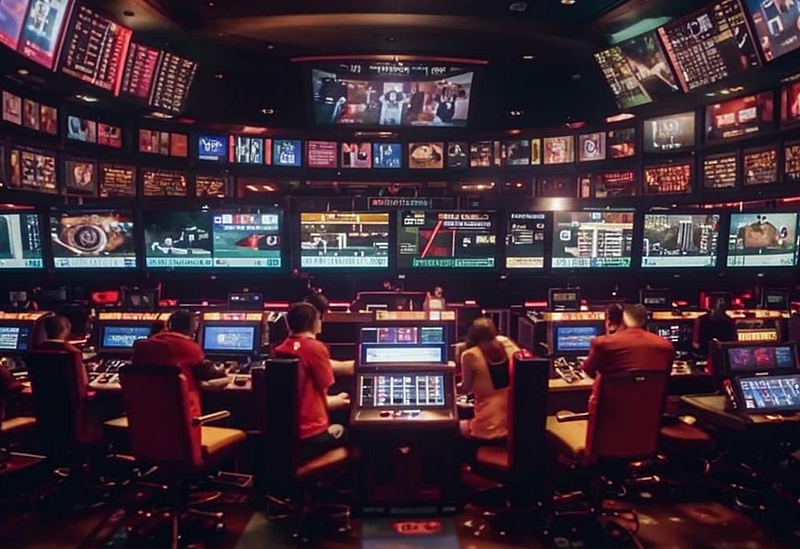Popular Sports Events and Betting Trends: From the Olympics to USDT
Contents
Sports have always played a crucial role in society, uniting people from different cultures and nationalities around shared interests and passions. From local competitions to global championships, sporting events are central to shaping cultural and social contexts, impacting millions of people worldwide. In the modern world, sports have become not only a means of maintaining health and physical fitness but also an important part of the economy, creating jobs, building infrastructure, and driving technological advancements.
Sports events, such as the Olympic Games, World and European Football Championships, Grand Slam tennis tournaments, and Formula 1 races, attract billions of viewers and serve as a stage for showcasing extraordinary abilities and competitive spirit.
An important aspect of the sports industry is sports betting. It not only adds an extra layer of engagement for fans but also represents a significant economic segment. Modern technologies and digitization have made betting more accessible, and the emergence of cryptocurrencies like USDT (Tether) has opened new opportunities for players and bookmakers. USDT, being a stablecoin, provides stability and convenience in transactions, making it an attractive option for betting amid the volatility of other cryptocurrencies.
Let’s explore the most popular sports events, the features of the Olympic Games, betting regulations in different countries, the use of cryptocurrencies in the betting industry, and the main types of events on which people commonly place bets.

Popular Sports Events
Sports events hold a special place in people’s lives worldwide, becoming true celebrations of sport where the best compete. Let’s look at some of the most significant and popular sports events that attract millions of viewers and participants.
Olympic Games: Summer and Winter
The Olympic Games are among the most prestigious and anticipated sporting events, bringing together athletes from around the world. The Summer and Winter Olympics are held every four years and include a wide range of sports. The Summer Games feature disciplines such as athletics, swimming, and gymnastics, while the Winter Games include skiing, biathlon, figure skating, and ice hockey. The Olympics are not just a venue for sports achievements but also promote cultural exchange and strengthen international bonds.
World and European Football Championships
Football is the most popular sport in the world, and the World and European Football Championships draw massive audiences. The FIFA World Cup, held every four years, captures the attention of billions of fans. The UEFA European Championship is also a major event that brings together the best national teams. These tournaments are not just sports competitions but also important cultural and social events.
Grand Slam Tennis Tournaments
The Grand Slam tennis tournaments include the four major tournaments: the Australian Open, the French Open, Wimbledon, and the US Open. These tournaments are the most prestigious in tennis, attracting top players and huge audiences. Winning a Grand Slam is considered the pinnacle of a tennis player’s career, and the events themselves become stages for unforgettable matches and records.
Formula 1 Races
Formula 1 is the top class of motorsport, drawing millions of fans interested in fast cars and high technology. Formula 1 races are held in various countries around the world, and each race is an exciting spectacle where the best drivers compete on the tracks. These events not only showcase drivers’ skills but also serve as a platform for innovations in automotive technology.
American Leagues: Super Bowl, NBA, NHL, MLB
In the United States, professional sports leagues hold immense significance and are incredibly popular. The Super Bowl, the championship game of the National Football League (NFL), is one of the most-watched sports events globally. The National Basketball Association (NBA), National Hockey League (NHL), and Major League Baseball (MLB) also attract a huge number of fans. These leagues not only organize regular competitions and championships but also significantly influence culture and public life in the US and beyond.
Olympics
The Olympic Games are a grand international sporting event held every four years, bringing together athletes from around the world. The modern Olympics began in 1896, when the French public figure Pierre de Coubertin revived the ancient traditions and organized the first modern Games in Athens, Greece.
For countries and athletes, participating in the Olympic Games is of great significance. It is not only an opportunity to showcase their sporting achievements on a global stage but also a chance to declare themselves as a nation capable of organizing a major international event. Victories at the Olympics bring glory to athletes and prestige and pride to their countries.
The opening and closing ceremonies of the Olympics are vibrant and spectacular events that symbolize the unity of peoples and cultures. During these ceremonies, colorful performances reflecting the traditions and customs of the host country take place. The medal tally determines the leading countries based on the number of medals won and is a source of pride for the winners.

Hosting the Olympic Games has a significant impact on the host countries. It stimulates infrastructure development, the construction of new sports facilities, and improvements in the transportation system. Additionally, the Olympics attract tourists and investments, which positively affect the country’s economy. The social effect lies in the increase in patriotism and the unification of the nation around a common goal.
In the coming years, the Olympic Games will be held in Milan and Cortina d’Ampezzo (2026 Winter), Los Angeles (2028), and Brisbane (2032). The selection of host cities is always the result of a thorough evaluation and assessment of the candidates’ capabilities to host such a large-scale event.
Sports and Betting Regulations in Different Countries
The laws regarding sports betting vary significantly across different countries and regions of the world. In the United States, after the repeal of the federal ban on betting in 2018, each state decides whether to legalize it within its territory. Currently, betting is allowed in more than 30 states, but with certain restrictions.
In Europe, sports betting is generally legal and regulated at the national level. For example, in the United Kingdom, the betting industry is strictly controlled, and bookmakers must be licensed. In other countries like France and Italy, state monopolies on betting are in place. In Asia, the situation is uneven. Some countries, including Singapore and Malaysia, completely prohibit betting, while in Macau and the Philippines, the betting industry is thriving and regulated by the government.
Strict rules prohibit athletes from participating in betting on competitions in which they compete. This is due to the risk of match-fixing and corruption. Violators can be disqualified and fined.
Sponsorship by bookmakers in sports is a topic of controversy. On the one hand, it brings in additional revenue, but on the other hand, it can lead to gambling addiction. Many leagues and organizations restrict or ban bookmaker advertising during broadcasts.
Various measures are taken to protect the integrity of sports. These include monitoring betting for suspicious activity, cooperating with law enforcement, educational programs for athletes and referees, and developing new technologies to detect match-fixing.
Events Most Commonly Bet On
The sports betting industry covers a wide range of events, but some sports and types of bets are particularly popular among players.
Top 5 Sports by Betting Volume
- Football (Soccer): The most popular sport for betting worldwide. A vast number of leagues, tournaments, and matches offer plenty of opportunities for betting.
- Basketball: The NBA and European leagues attract a lot of attention. The dynamic nature of the game and the frequency of matches make basketball appealing for betting.
- Tennis: The year-round tournament schedule and the individual nature of the sport ensure consistent interest from bettors.
- American Football: Especially popular in the U.S. The NFL and college football generate huge volumes of bets.
- Horse Racing: Traditionally a popular sport for betting, particularly in the UK and the U.S.

Betting on Matches, Tournaments, and Championships
Most bets are placed on the outcomes of individual matches or games. However, there is growing popularity for long-term bets on tournament or championship winners. Such bets can offer high odds and keep players engaged throughout the season.
Betting on Player and Team Statistics
Modern bookmakers offer a wide range of bets on individual player statistics (e.g., number of goals, assists, rebounds) and team statistics (e.g., ball possession, corners, fouls). These bets require deep analysis and understanding of the sport, which attracts experienced bettors.
Exotic and Non-Sport Bets
In recent years, there has been a significant rise in interest in unconventional and exotic bets. This trend reflects bookmakers’ efforts to attract new audiences and diversify offerings for existing customers. Although such bets represent a relatively small share of the market, they draw considerable media attention and often go viral on social media.
Examples of exotic sports bets include:
- Weather Conditions: Bets on the temperature during a football match or whether it will rain during a tennis tournament.
- Participants’ Appearance: Wagers on the color of the coach’s clothing, a player’s hairstyle, or even whether an athlete will wear a particular brand of shoes.
- Events Outside the Game: Bets on who will perform the anthem before a match, which song will play during halftime, or how many times the camera will show a celebrity in the stands.
- Broadcast Statistics: Wagers on the number of replays of a specific moment in the game or which word the commentator will say first.
- Fan Behavior: Bets on a streaker running onto the field or how many times the wave will be shown in the stadium.
Non-sports bets are also gaining popularity. These include:
- Political Events: Bets on election outcomes, government appointments, or even the content of politicians’ speeches.
- Entertainment Industry: Wagers on the winners of the Oscars, Emmys, or Grammys, as well as the outcomes of popular TV shows like Eurovision or reality projects.
- Technological Achievements: Bets on the release date of a new iPhone or which company will be the first to send a human to Mars.
- Weather and Natural Phenomena: Wagers on the date of the first snowfall in a particular city or the number of hurricanes in a season.
- Royal Families: Bets on the names of future royal children or the dates of royal weddings.
- Social Media: Wagers on the number of followers a celebrity will gain or the content of influential people’s posts.

Reasons for the Popularity of Exotic Bets:
- Novelty and Entertainment: Such bets are often seen as fun entertainment, attracting people who may not be interested in traditional sports wagers.
- Media Coverage: Unusual bets easily become newsworthy, providing free publicity for bookmakers.
- Low Stakes, High Odds: These events often offer high odds with small bet amounts, which is appealing to players.
- Expanding the Audience: Exotic bets help attract new customers who may then become interested in traditional wagering.
However, this trend has its critics. Some experts believe that such bets can contribute to gambling addiction or trivialize serious events, such as political elections. Additionally, these types of bets are harder to regulate, which may pose risks to the integrity of the process.
Despite this, exotic and non-sports bets are likely to continue gaining popularity, reflecting the broader trend towards the gamification of various aspects of life and the desire for new forms of entertainment and excitement.
USDT Cryptocurrency in the Betting World
Cryptocurrencies, particularly stablecoins, have become a new trend in the sports betting industry. Among them, Tether (USDT) holds a special place, actively used by both players and bookmakers.
Tether (USDT) is a stablecoin whose value is pegged to the US dollar at a 1:1 ratio. USDT was created to ensure stability and liquidity in the cryptocurrency market. In the betting sphere, USDT is used as a means of payment and fund storage, allowing players to easily transfer money between different platforms and maintain the value of their assets. The use of USDT in betting has several advantages:
- Stability: Unlike volatile cryptocurrencies, USDT’s value remains stable, making it convenient for long-term betting planning.
- Transaction Speed: Transfers in USDT are faster than traditional bank transfers.
- Low Fees: USDT transactions typically have lower fees compared to bank transfers.
- Anonymity: USDT provides a higher level of privacy compared to traditional payment methods.
- Global Accessibility: USDT can be used for betting anywhere in the world where it is legally permitted.
Many popular bookmakers have already started accepting USDT:
- 1win (1win.pro).
- 1xBet (1xbet.com).
- MostBet (mostbet.com).
- Betmaster (betmasterlink.com).
These platforms allow users to deposit and withdraw winnings in USDT, making the process more convenient for users.Despite the advantages, the use of USDT and other stablecoins in betting comes with certain risks:
- Regulatory risks: Many countries have not yet defined the legal status of cryptocurrencies, which could lead to restrictions in the future.
- Technological risks: Like any digital currency, USDT may be susceptible to hacking attacks or technical failures.
- Collateral issues: There are disputes about whether Tether is fully backed by dollar reserves.
- Centralization: Unlike decentralized cryptocurrencies, USDT is centrally managed, which draws criticism from the crypto community.
Despite these risks, the popularity of USDT in the betting world continues to grow, reflecting the overall trend towards the digitalization of financial transactions in the sports industry.
Conclusion
Sports and the betting industry continue to evolve. We are witnessing a growing interest in esports, virtual sports, and the use of artificial intelligence for data analysis. Virtual and augmented reality technologies may change how sports events are viewed and how betting is interacted with.In the near future, further integration of technology into sports and betting is expected. The use of cryptocurrencies and blockchain technologies is likely to expand to ensure transparency and security in betting.
Additionally, an increase in global regulation of the betting industry can be anticipated.It is crucial to remember that sports betting should remain a form of entertainment rather than a means of making money. Responsible gambling practices should be adopted, including setting spending limits and not allowing gambling to override rational decision-making. Bookmakers and regulators must continue to work on preventing gambling addiction and ensuring fairness in sports.
